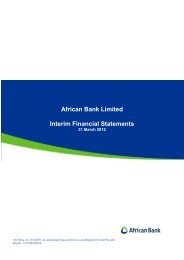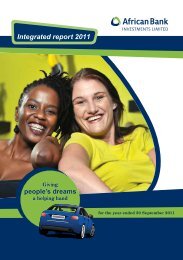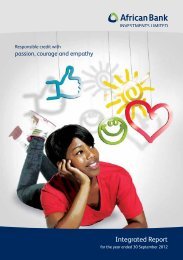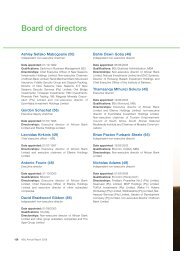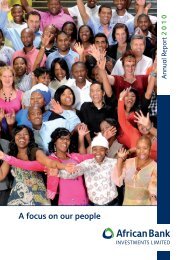Download - African Bank
Download - African Bank
Download - African Bank
Create successful ePaper yourself
Turn your PDF publications into a flip-book with our unique Google optimized e-Paper software.
Social matters<br />
Code of ethics<br />
<strong>African</strong> <strong>Bank</strong>’s code of ethics commits it to the highest<br />
standards of integrity, behaviour and principles. Staff<br />
at all levels participated in drawing up the code and<br />
are required to maintain the highest ethical standards<br />
in ensuring that our business practices are conducted<br />
in a manner that, in all reasonable circumstances, is<br />
above reproach.<br />
Fraud and fraud<br />
prevention<br />
Channel for whistle blowing – <strong>African</strong><br />
<strong>Bank</strong> Retail brought its ethics line inhouse<br />
in November 2001. Since then,<br />
there has been a significant increase in<br />
the use of this facility. This was<br />
attributable to the reassurance among<br />
staff of the full protection granted to<br />
them when supplying information and<br />
increased awareness of the channels of<br />
communication available in reporting<br />
unethical behaviour through the<br />
prominent display of posters in all offices<br />
of the bank, articles in the internal<br />
magazine, and frequent announcements<br />
of rewards being paid for tip-offs on the<br />
unit’s internal TV channel.<br />
Apart from the normal channels of<br />
reporting unethical behaviour through<br />
management, the following fraudreporting<br />
channels exist:<br />
A toll-free number, 0800 20 20 18,<br />
where callers can remain<br />
anonymous<br />
A fraud ethics e-mail address,<br />
abfraudethics@africanbank.co.za<br />
A dedicated fraud fax line<br />
(011) 315 3424<br />
Credit Indemnity has an intranet contact<br />
link to the forensic department and its<br />
toll-free number is 0860 333 004.<br />
A fraud rewards programme pays<br />
quarterly prizes to the three most<br />
<strong>African</strong> <strong>Bank</strong> Investments Limited 78<br />
deserving cases as adjudicated by a<br />
management panel. An annual reward is<br />
paid on a lucky-draw basis to encourage<br />
staff to report all suspected fraud,<br />
irrespective of the outcome or<br />
magnitude of the issue being reported.<br />
Fraud practices<br />
Group policy is to identify and promptly<br />
investigate any possibility of fraudulent<br />
or related dishonest activities against<br />
the group and, when appropriate,<br />
pursue legal remedies. In an effort to<br />
rid the group of such transgressions,<br />
the board supports the zero tolerance<br />
policy on fraud, including dishonesty,<br />
non-adherence to procedures,<br />
negligence, breach of fiduciary duties,<br />
fraud, theft and other irregularities.<br />
This is demonstrated in the internal<br />
magazine where the names of all<br />
offenders who have been dismissed<br />
as a result of unethical behaviour are<br />
publicised. The forensic investigation<br />
services department continues to<br />
entrench this culture.<br />
All staff are responsible and accountable<br />
for exercising due diligence and control<br />
to prevent, detect and report acts or<br />
suspicion of acts of a reportable nature,<br />
as defined in the fraud policy. Fraud<br />
awareness and training initiatives are<br />
continuously provided to staff on various<br />
issues. This has yielded positive results.<br />
Exception reports and a range of quality<br />
tools and techniques are used as an early<br />
detection method in identifying<br />
fraudulent applications prior to<br />
disbursing loans. Confirmed fraudulent<br />
applications, known bogus companies<br />
and fraud alerts received from the South<br />
<strong>African</strong> Fraud Prevention Services are<br />
added to a daily internal checklist to<br />
prevent further fraud.<br />
The social impact of<br />
unsecured lending<br />
The major slice of the economically-<br />
active population is considered high-risk<br />
clients due to three reasons: inability to<br />
service personal debt, lack of financial<br />
education and poor historical payment<br />
patterns. Traditional banks do not<br />
consider these high-risk clients their<br />
primary target market, and as<br />
a consequence these clients traditionally<br />
had limited access to credit. According<br />
to the LSM classification framework<br />
these high-risk clients fall into the lower<br />
end of the scale.<br />
The contribution of these clients to the<br />
South <strong>African</strong> economy is real – from a<br />
sheer numbers perspective as well as<br />
their indirect contribution to helping<br />
others (mostly family members) become<br />
involved in the economic cycle of South<br />
Africa. The lack of access to credit for a<br />
huge part of the economically-active<br />
population is detrimental to the<br />
economy. Perceptions of customer<br />
exploitation remain.<br />
ABIL’s innovative business model<br />
helps it to apply economic principles<br />
to the benefit of its clients and its<br />
investors.



